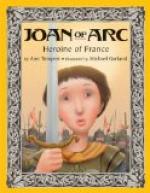June had well-nigh passed ere we began our march from Gien—that triumphant march headed by the King and the Maid—and July had run half its course since we had been upon the road. For we had had a great tract of country to traverse, and a large army must needs have time in which to move itself.
And now upon a glorious golden evening in that month of sunshine and summertide, we saw before us—shining in a floating mist of reflected glory—the spires and towers, the walls and gates of the great city of Rheims—the goal of our journeyings—the promised land of the Maid’s visions and voices!
Was it indeed a city of stone and wood which shone before us in the level rays of the sinking sun? I asked that question of myself; methinks that the Maid was asking it in her heart; for when I turned my eyes upon her, I caught my breath in amaze at her aspect, and I know now what it is to say that I have looked upon the face of an angel!
She had dropped her reins, and they hung loose upon her horse’s neck; her hands were clasped together in a strange rapture of devotion. Her head was bare; for she often gave her headpiece to her page to carry for her, and in the evenings did not always replace it by any other covering. Her hair had grown a little longer during these months, and curled round her face in a loose halo, which in the strong and ruddy light of the setting sun, shone a glorious golden colour, as though a ray of heavenly light were enmeshed within it.
But it was the extraordinary brightness of those great luminous eyes, the rapt and intense expression of her face which arrested my attention, and seemed for a moment to stop the triumphant beating of my heart. It was not triumph which I read there, though there was joy and rapture and peace, beyond all power of understanding. It was the face of one who sees heaven open, and in the wonder and awe of the beatific vision forgets all else, and feels not the fetters of the flesh, heeds not those things which must needs intervene ere the spirit can finally be loosed to enter upon blessedness and rest, but soars upwards at once into heavenly regions.
The town of Rheims lay before us. The inhabitants were pouring forth to meet us. We saw them coming over the plain, as we watched the walls and buildings, glowing in the mystic radiance of the summer’s evening, loom up larger and grander and sharper before us. It was no dream!
And yet who would have thought it possible three months ago? In mid-April the iron grip of the English lay all over the land north of the Loire, and the south lay supine and helpless, stricken with the terror of the victorious conqueror. Orleans was at its last gasp, and with its fall the last bulwark would be swept away; all France must own the sway of the conqueror. The King was powerless, indolent, ready to fly at the first approach of peril, with no hope and no desire for rule, doubtful even if he had the right to take upon himself the title of King, careless in his despair and his difficulties. The army was almost non-existent; the soldiers could scarce be brought to face the foe. One Englishman could chase ten of ours. The horror as of a great darkness seemed to have fallen upon the land.




